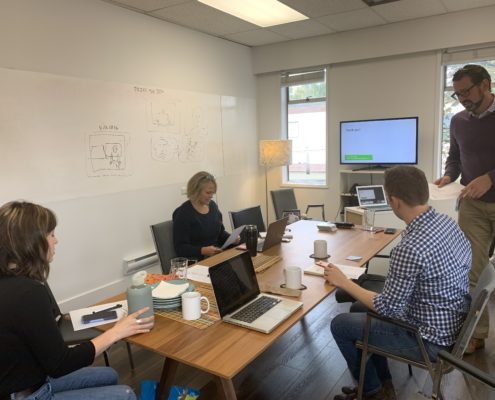
“I hope we’ll be able to walk away with a bank of practical strategies for…our workplace”– Screen Siren Pictures
On a rainy morning in Vancouver, the team at Screen Siren Pictures gathered round their boardroom to take a Carbon Literacy Course provided by the Reel Green Initiative. Screen Siren is responsible for powerful features such as Indian Horse and Hector and the Search for Happiness and television programming like Canada In A Day and Bud Empire.
The company embarked on a condensed 3-hour session with Andrew Robinson, Senior Green Spark Group Consultant who often teaches the standard 6-hour course at Act Safe. The condensed structure allowed for frank discussion around reducing the carbon footprint on set and creating a reshaped mindset where green practices feel manageable and doable for everyone on set from the PA to the director level. The carbon literacy course is made possible through the collaboration between The British Academy of Film and Television Arts (BAFTA) and Creative BC to share tools and knowledge on going green in the motion picture industry.
We spoke with Trish Dolman, President of Screen Siren Pictures and Andrea Feltrin, Office Manager on their experiences with the course and making green practices part of their everyday life.
What sparked interest in taking your whole company at Screen Siren Pictures through Reel Green’s carbon literacy course?
Trish Dolman (TD): Well because I am an ancient producer now, I learned of the Reel Green initiative years ago when it was started. This inspired me to create a Green Committee as a national board member of the CMPA. We created the committee and came up with an environmental policy for the CMPA, it’s members, and focused the theme of the Prime Time Conference on environmental responsibility for one year as well.
Have you seen Reel Green’s influence in the industry already? In what ways have you seen this emerge?
TD: Yes, as an early adopter, Creative BC has influenced the industry. I’ve seen composting happen on productions, the creation of the fixed power for film crews downtown, and productions moving away from paper.
Describe how your company has already been going green.
TD: We established a green policy ten years ago, again inspired by Reel Green. We eliminated plastic water bottles on all our productions and made our environmental policy part of our start packs. We have an extensive compost and recycling system in our office.
We built a large set several years ago and stored it in hopes of re-using it on another production. We were able to re-sell it to someone who wanted to build a house out of the materials. We spent far more money however storing that set than it was worth, but at least it did not end up in a landfill.
How do you think specific training relevant to motion picture will make a greater impact than general environmental training programs?
Andrea Feltrin: Sometimes hearing about the magnitude of these environmental issues can be paralyzing. You wonder if your small efforts will ever make a difference. I think it’s more accessible for people to learn how specific decisions they make in their workplace can have a measurable impact – especially if those changes are influencing a larger group, like a film crew. It’s reassuring to know there are practical solutions that are both cost-effective and easy to implement within our industry.
What do you hope your team have gained from the course?
AF: I hope we’ll be able to walk away with a bank of practical strategies for implementing into our workplace, and maybe some inspiration.
Have you seen green practices as a key priority on productions?
AF: I’ve seen some green initiatives being taken on productions, but never as a key priority. It always seems like an afterthought, or a call-sheet note. It would be great if there was more significance surrounding these efforts, or if productions shared their green goals at the beginning so everyone felt inclined to participate.
In your opinion, what are some of the obstacles to going green in the motion picture industry? And how do you hope the Reel Green initiative can help you overcome them?
AF: I think the biggest hurdle is the resistance to change. For every person who makes an effort, there will always be someone who doesn’t want to shake things up because that’s how they’ve done it for years. It can be frustrating. I think it’s great that the Reel Green Carbon Literacy Course is focused on education because that’s a powerful tool. Hopefully we’ll get to a point where it’s a mandatory training requirement, just like the safety courses. I feel it’s equally as important.
The team remarked that they came away with tools and strategies for reducing their carbon footprint and the knowledge that being #ReelGreen is actionable for everyone at every level of a production. As the last slide of the course highlighted, one small act like Greta Thunberg’s ‘School Strike for Climate’ can change the world and a mindset.





